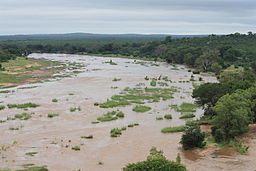Olifants River (Limpopo)
| Olifants River (Lepelle or Obalule) | |
| Olifantsrivier, Rio dos Elefantes | |
| River | |
|
Olifants River as it flows through the Kruger National Park
|
|
| Name origin: Olifant means "elephant" in Afrikaans, Obalule, means "long, stretched-out one" and Lepelle means "slow-flowing" or "distant" | |
| Country | South Africa and Mozambique |
|---|---|
| Provinces | Mpumalanga, Limpopo and Gaza |
| Tributaries | |
| - left | Letaba River |
| - right | Steelpoort River |
| Source | Near Bethal |
| - location | Mpumalanga, South Africa |
| - elevation | 1,800 m (5,906 ft) |
| - coordinates | 26°20′33″S 29°49′47″E / 26.34250°S 29.82972°E |
| Mouth | Limpopo River |
| - location | Gaza Province, Mozambique |
| - coordinates | 24°6′44″S 32°38′25″E / 24.11222°S 32.64028°ECoordinates: 24°6′44″S 32°38′25″E / 24.11222°S 32.64028°E |
| Basin | 54,570 km2 (21,070 sq mi) |
|
Location of the Olifants-Limpopo confluence
|
|
The Olifants River, Lepelle or Obalule (Afrikaans: Olifantsrivier; Portuguese: Rio dos Elefantes) is a river in South Africa and Mozambique, a tributary of the Limpopo River. It falls into the Drainage Area B of the Drainage basins of South Africa. The historical area of the Pedi people, Sekhukhuneland, is located between the Olifants River and one of its largest tributaries, the Steelpoort River.
The Olifants River has its origin between Breyten and Bethal, Mpumalanga Province. It flows north towards Limpopo Province through Witbank Dam and then the Loskop Dam and is forced east by the Transvaal Drakensberg, cutting through at the Abel Erasmus Pass and then flowing east further across Limpopo Province to join with the Letaba River. It crosses into Gaza Province, Mozambique, after cutting through the Lebombo Mountains by way of the Olifants Gorge, becoming the Rio dos Elefantes, and finally joining the Limpopo River after 40 km before it enters the Indian Ocean at Xai-Xai north of Maputo.
Overgrazing in sections of its middle course result in the river carrying away eroded soil after heavy rains. The Olifants river has become one of the most heavily polluted rivers in South Africa, not by human or industrial waste, but by thriving green algae.
...
Wikipedia


